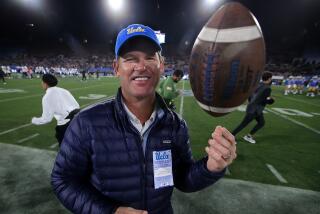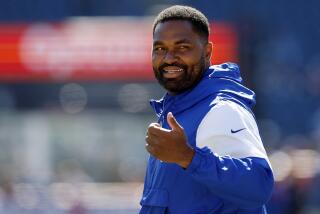Long Journey Prepared Campo for Cowboy Job
- Share via
IRVING, Texas — Dave Campo had plenty of career options while growing up.
He was a good enough middle infielder to get drafted by the Philadelphia Phillies, a good enough defensive back/running back to start for Central Connecticut State and a good enough folk singer to cut an album with his band, the Windjammers.
But when he finished college, Campo wasn’t sure what to do. A buddy talked him into joining the National Guard and while waiting to be activated, Campo took a job as a football coach at New London (Conn.) High.
Campo guided the 1970 freshmen to an 8-0 record and their league’s championship. He also was an assistant on the varsity team, which won the state title.
“At that point I said, ‘This is pretty good,”’ Campo said.
Thirty years and 12 stops later, Campo is a head coach for the first time. His new post is with the Dallas Cowboys, a team that’s had only four other coaches in its 40-year history.
Campo, though, is better prepared than predecessors Jimmy Johnson, Barry Switzer and Chan Gailey in one very important way: With 11 years’ experience working for owner-general manager Jerry Jones, he knows exactly what he’s getting into.
Campo is one of two coaches who’ve been in Dallas ever since Jones took over. That means he’s been through the bad times (1-15 in ‘89), good times (three Super Bowl victories) and in-between (a 24-24 record the last three years).
“What I’ve learned is that Jerry is passionate, is committed, wants to do everything he can for this organization and fans because of the expectations,” Campo said. “And that’s exactly what I want to do.”
Jones also recognizes the importance of his relationship with Campo. At the Jan. 26 news conference to announce the hiring, Jones described Campo as being “uniquely qualified to coach the Dallas Cowboys.”
“Dave Campo is as deserving of this opportunity as any coach who has ever worked for the Dallas Cowboys,” Jones said. “There was no doubt in my mind that the best man was right here.”
Jones’ heavy-handed ways have created the perception that by taking the job Campo has agreed to be the owner’s puppet.
Campo’s response is that he prefers to view Jones as the general manager. From that perspective, Campo considers Jones’ “socks-to-jocks” involvement no different than other GMs.
“The GM is actively involved in the everyday running of a football team,” Campo said. “The great thing about this situation is it doesn’t take the GM long to get to the owner.”
At 52, Campo wants to be seen as his own man, not an extension of Jones or a disciple of any one coach.
After all, he’s worked for 13 of them since he was a linebackers coach at Central Connecticut State in 1971.
“I’d prefer to say there’s probably a little bit of each of them in me and there’s a certain amount that’s just me,” Campo said.
“I can tell you the things I believe in: discipline, accountability, family atmosphere, people respecting each other’s abilities, taking care of your own responsibility, don’t give your buddy the world to cover. Those are the kinds of things you learn on an everyday basis.”
Campo’s nomadic career got rolling in 1972 when he became a graduate assistant to coach Bob Ford at Division III Albany State in New York. Although Campo went on to work for Johnson, Switzer, Jackie Sherrill, Johnny Majors and Dick MacPherson, he still considers Ford his mentor.
“Davey had an undying curiosity about everything,” said Ford, who still coaches in Albany, now a Division I-AA program. “He would analyze everything from how we did a Sunday film breakdown to how we handled lunch to how we handled scripts.”
Ford helped Campo get his next job -- defensive coordinator at Bridgeport -- but that didn’t end up being such a big favor. The school shut down its program the next year.
Campo got another job, though, thanks to a chance encounter with Majors at a coaching convention.
A year at Pittsburgh was followed by a move to Washington State to be Sherrill’s secondary coach. Campo could’ve gone back to Pitt with Sherrill when he replaced Majors the following year, but Campo wanted to remain in that part of the country so he went to Boise State.
His odyssey continued at Oregon State, Weber State, Iowa State and Syracuse. Then he landed on Johnson’s staff at Miami in 1987. It was Campo’s 11th stop in 17 years.
When Johnson replaced Tom Landry as the Cowboys’ coach in ‘89, Campo was among the coaches taken to Dallas. He started as a defensive assistant and was promoted to secondary coach two years later. Switzer made him defensive coordinator in 1995.
Looking back, Campo remembers wanting to be a high school head coach, then a college coach, yet now he’s landed this prestigious job and a five-year contract worth more than $4 million.
“My goals have changed,” Campo said, smiling. “Some people have the big goal. Mine has always been, ‘OK, I’ve reached this one, let’s go to the next one.”’
It’s hard to imagine where the next step will take Campo. About the only place he won’t be headed is back into the music business.
“You have to understand one thing,” Campo said in his usual, raspy tone. “I’ve been screaming at guys for 30 years. So my voice isn’t exactly the same.”


